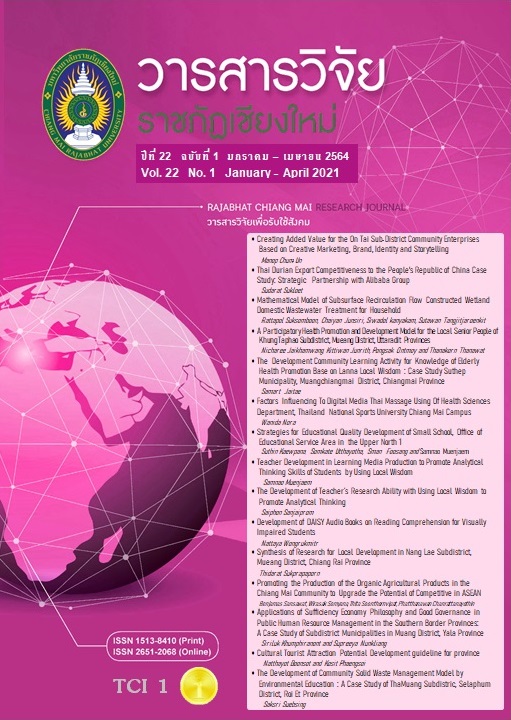การพัฒนารูปแบบการจัดการขยะของชุมชนโดยใช้กระบวนการทางสิ่งแวดล้อมศึกษา กรณีศึกษา: ตำบลท่าม่วง อำเภอเสลภูมิ จังหวัดร้อยเอ็ด โดยใช้กระบวนการทางสิ่งแวดล้อมศึกษา
DOI:
https://doi.org/10.14456/rcmrj.2021.240548คำสำคัญ:
การพัฒนารูปแบบ, การจัดการขยะมูลฝอย, กระบวนการทางสิ่งแวดล้อมศึกษาบทคัดย่อ
การวิจัยมีวัตถุประสงค์เพื่อ 1) เพื่อศึกษารูปแบบการจัดการขยะมูลฝอยของชุมชนในเขตตำบล ท่าม่วง อำเภอเสลภูมิ จังหวัดร้อยเอ็ด โดยใช้กระบวนการทางสิ่งแวดล้อมศึกษา 2) เพื่อพัฒนารูปแบบการจัด การขยะมูลฝอยของชุมชนในเขตตำบลท่าม่วง อำเภอเสลภูมิ จังหวัดร้อยเอ็ด เพื่อโดยใช้กระบวนการทางสิ่งแวดล้อมศึกษา 3) เพื่อประเมินรูปแบบการจัดการขยะมูลฝอยของชุมชนในเขตตำบลท่าม่วง อำเภอ เสลภูมิ จังหวัดร้อยเอ็ด กลุ่มตัวอย่าง ระยะที่ 1 วิจัยเชิงปริมาณ Quantitative research โดยใช้แบบ Survey Research กลุ่มตัวอย่าง ได้แก่ ประชาชนในเขตตำบลท่าม่วง อำเภอเสลภูมิ จังหวัดร้อยเอ็ด โดยใช้การคำนวณจากสูตรของยามาเน่ (Yamane, 1973) จำนวน 400 คน ระยะที่ 2 วิจัยเชิงกึ่งทดลองแบบ Quasi - experiment research) กลุ่มตัวอย่าง จำนวน 100 คน ได้มาจากการเลือกแบบเจาะจง (Purposive sampling) เครื่องมือที่ใช้ในการวิจัยครั้งนี้ ประกอบด้วย แบบสอบถาม แบบทดสอบ แบบประเมิน แบบสังเกต และคู่มือการจัดการขยะในชุมชนเพื่อการอนุรักษ์สิ่งแวดล้อม สถิติที่ใช้ในการวิเคราะห์ข้อมูล ได้แก่ สถิติพื้นฐาน และใช้สถิติ Pair t-test ผลการวิจัย พบว่า
1) ประชาชนตำบลท่าม่วง อำเภอเสลภูมิ จังหวัดร้อยเอ็ด มีความคิดเห็นด้านสิ่งแวดล้อมศึกษาโดยภาพรวมอยู่ในระดับมาก มีค่าเฉลี่ยเท่ากับ 4.31 ส่วนเบี่ยงเบนมาตรฐานเท่ากับ 0.41 เมื่อพิจารณาเป็นรายด้าน พบว่า ด้านเจตคติมากที่สุด รองลงมาคือ ด้านความรู้ความเข้าใจ และด้านทักษะ ตามลำดับ
2) ผลการเปรียบเทียบความรู้ความเข้าใจก่อนและหลังการอบรมเชิงปฏิบัติการแบบมีส่วนร่วม เรื่องการพัฒนารูปแบบการจัดการขยะของชุมชนตำบลท่าม่วง อำเภอเสลภูมิ จังหวัดร้อยเอ็ด โดยใช้กระบวนการทางสิ่งแวดล้อมศึกษาของกลุ่มตัวอย่างพบว่า คะแนนเฉลี่ยจากการทดสอบหลังการอบรมเชิงปฏิบัติการแบบมีส่วนร่วมในความรู้เรื่องสิ่งแวดล้อมศึกษา การมีจิตสาธารณะในการจัดการขยะ พฤติกรรมการจัดการขยะในชุมชน การมีส่วนร่วมในการจัดการขยะในชุมชน และการอนุรักษ์สิ่งแวดล้อมในชุมชน และภาพรวมของผลสัมฤทธิ์การอบรมคะแนนเฉลี่ยสูงกว่าก่อนการอบรมเชิงปฏิบัติการแบบมีส่วนร่วมอย่างมีนัยสำคัญทางสถิติที่ระดับ 0.05, 0.05, 0.05, 0.05, 0.05 และ 0.05 อย่างมีนัยสำคัญ ตามลำดับ
3) ผลการประเมินรูปแบบการจัดการขยะมูลฝอยของชุมชนในเขตตำบลท่าม่วง อำเภอเสลภูมิ จังหวัดร้อยเอ็ด โดยภาพรวมอยู่ในระดับมากที่สุด มีค่าเฉลี่ยเท่ากับ 4.54 ส่วนเบี่ยงเบนมาตรฐานเท่ากับ 0.47 เมื่อพิจารณาเป็นรายด้าน พบว่า ด้านความเป็นประโยชน์มากที่สุด รองลงมาคือ ด้านความเป็นไปได้ และด้านความถูกต้อง ตามลำดับ ส่วนการดำเนินการโครงการนำล่องทั้ง 3 โครงการ โดยภาพรวมอยู่ในระดับดีมากทุกโครงการคือ 1) โครงการชุมชนนำร่องและต้นแบบในการจัดการขยะมูลฝอยในชุมชน 2) โครงการส่งเสริมการมีส่วนร่วมของชุมชนในการคัดแยกขยะที่ต้นทาง และ 3) โครงการประกวดการบริหารจัดการขยะในชุมชนบ้านนากระตึบ ตำบลท่าม่วง อำเภอเสลภูมิ จังหวัดร้อยเอ็ด ตามลำดับ
Downloads
เอกสารอ้างอิง
Chaisombat, W., Charoensiri, W., & Jirasombat, S. (2017). Development of a community solid waste management model based on the philosophy of Sufficiency Economy, Chiang Yuen District. Mahasarakham Province. Phimoldhama Research Institute Journal, 4,(2), 195-206. (In Thai)
Chomsuphap, I., Isarangkunnaayudhya, W., & Purisan, K. (2018). Solid Waste Management Model by the Community Participation. In Dongsakran Village, Wangsawab Sub – district, Phuphaman District, Khon Kaen Province. College of Asian Schokars Journal, 8, (Special edition), 308-322. (In Thai)
Khuwananyu, N. T. (2011). Holistically Integrative Research. (2nd ed.). Bangkok: Chulalongkorn University. (In Thai)
Muhamudarli, H. (2018). Garbage Management Model in Bangkok Metropolitan Administration Area.Journal of Rangsit Graduate Studies in Business and Social Sciences, 4,(2), 297-314. (In Thai)
Pollution Control Department Ministry of Natural Resources and Environment. (2019). Thailand Pollution Situation 2018. Bangkok: Pollution Control Department, Ministry of Natural Resources and Environment. (In Thai)
Saiyod, L., & Saiyod, A. (2000). Educational research techniques. (3rd ed.). Bangkok: Suveeriyasan. (In Thai)
Sawatdichitang, N., Saenpoch, K., Kingminghae, P., & Auntachai, S. (2014). The Development Model Management Solid Waste of Community in Udon Thani Municipality. Journal of Graduate Study in Humanities and Social Sciences, 3(1), 47-64. (In Thai)
Suebsing, S., Namnaphon, K., Udomsak, N., & Boonpok, S. (2017). Development of environmental conservation models of Tha Muang Sub-district Community, Selaphum District, Roi Et Province Using the process of environmental studies. Roi-Et: Roi-Et Rajabhat University. (In Thai)
Tangpratchayakul, A., Sripuna, S., & Nasaan, S. (2016). Effect of Using the Model of Whole Cycle Participatory Solid Waste Management of the Communities in Somdet Municipality, Kalasin Province. Ph.D. in Social Science Journal, 6, (3), 123-137. (In Thai)
Tha Muang Sub-district Municipality. (2019). Waste management contest project in Ban Na Kratue community, Tha Muang Sub-district, Selaphum District, Roi Et Province. Roi Et: Tha Muang Municipality. (In Thai)
Yamane, Taro. (1973). Statistics: An Introductory Analysis. (3th ed.). Newyork : Harper and Row Publication.
ดาวน์โหลด
เผยแพร่แล้ว
รูปแบบการอ้างอิง
ฉบับ
ประเภทบทความ
สัญญาอนุญาต
1. บทความ ข้อมูล เนื้อหา รูปภาพ ฯลฯ ที่ได้รับการตีพิมพ์ใน “Community and Social Development Journal” ถือเป็นลิขสิทธิ์ของ Community and Social Development Journal มหาวิทยาลัยราชภัฏเชียงใหม่ และเพื่อให้เผยแพร่บทความได้อย่างเหมาะสมผ่านสื่อสิ่งพิมพ์และอิเล็กทรอนิกส์ ผู้เขียนยังคงถือครองลิขสิทธิ์บทความที่ตีพิมพ์ภายใต้ใบอนุญาต Creative Commons Attribution (CC BY) ซึ่งอนุญาตให้เผยแพร่บทความซ้ำในแหล่งอื่นได้ โดยอ้างอิงต้องอ้งอิงบทความในวารสาร ผู้เขียนต้องรับผิดชอบในการขออนุญาตผลิตซ้ำเนื้อหาที่มีลิขสิทธิ์จากแหล่งอื่น
2. เนื้อหาบทความที่ปรากฏในวารสารเป็นความรับผิดชอบของผู้เขียนบทความโดยตรง ซึ่งกองบรรณาธิการวารสารไม่จำเป็นต้องเห็นด้วยหรือร่วมรับผิดชอบใดๆ














